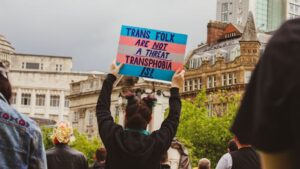
Transgender rights have gained increased visibility in recent years. However, many transgender individuals still face significant challenges that impact their daily lives and well-being. This article explores the current issues affecting the transgender community. Additionally, it highlights key organizations dedicated to advocating for trans rights and social justice.
At Killian Counseling Services LLC, we provide supportive services. Moreover, we stand as allies committed to creating a safe space for transgender clients. We believe in fostering an inclusive environment where all individuals can explore their identities and receive the care they deserve.
Current Challenges Facing Transgender Individuals
- Discrimination and Violence
Transgender people often encounter discrimination in various aspects of life. For example, they face challenges in employment, housing, and healthcare. According to the Human Rights Campaign, transgender individuals—especially transgender women of color—are disproportionately affected by violence. Consequently, this leads to a troubling number of murders each year. This violence stems from systemic discrimination and societal stigma. - Healthcare Access
Many transgender individuals face barriers to healthcare. For instance, insufficient insurance coverage for transition-related care and discrimination from providers can limit access. Additionally, there is often a lack of mental health resources. The World Professional Association for Transgender Health (WPATH) emphasizes the need for affirming healthcare practices that cater to the unique needs of transgender individuals. - Legal Recognition
Legal recognition of gender identity is another significant challenge. Many states have laws that complicate the process of changing gender markers on identification documents. In fact, some states do not allow changes at all. This lack of legal recognition can lead to harassment and discrimination in everyday situations, such as job applications or accessing services. - Social Stigma and Mental Health
The stigma surrounding being transgender contributes to higher rates of mental health challenges. For example, individuals may experience anxiety, depression, and suicidal ideation. The Trevor Project highlights that LGBTQ+ youth, particularly transgender youth, face increased risks of mental health issues due to rejection and discrimination. - Youth Issues
Transgender youth encounter unique challenges, such as bullying and inadequate support from schools. Moreover, they may have difficulties accessing affirming healthcare. The American Academy of Pediatrics emphasizes the importance of creating supportive environments for trans youth to promote their mental health and well-being.
Advocacy Efforts and Organizations
Several organizations are working to address these challenges and promote trans rights. Here are some notable ones:
- Human Rights Campaign (HRC): HRC is one of the largest LGBTQ+ advocacy groups in the U.S. It works to improve the lives of transgender individuals through public education, advocacy for inclusive policies, and direct support for local communities.
- Transgender Law Center (TLC): TLC is dedicated to advancing the rights and dignity of transgender people. They achieve this through legal advocacy, public policy, and grassroots organizing. Their focus includes issues such as healthcare access and employment discrimination.
- National Center for Transgender Equality (NCTE): NCTE advocates for policy changes to improve the lives of transgender individuals. They conduct research and provide resources. Additionally, they mobilize grassroots efforts to push for comprehensive protections for trans rights at the federal and state levels.
- The Trevor Project: Focused on LGBTQ+ youth, The Trevor Project provides crisis intervention and suicide prevention services. Their advocacy efforts aim to create supportive environments for trans youth in schools and communities.
- GLAAD: GLAAD promotes fair and accurate representation of transgender individuals in media. By challenging stereotypes and advocating for inclusive narratives, GLAAD helps shift public perception and foster acceptance of transgender people.
How You Can Help
Advocacy for trans rights requires collective action. Here are some ways you can support the transgender community:
- Educate Yourself and Others: Understanding the challenges faced by transgender individuals is crucial for effective advocacy. Share information and resources to raise awareness about trans issues.
- Support Trans-led Organizations: Donating time or resources to organizations advocating for trans rights can create significant change. Consider volunteering, attending events, or contributing financially.
- Be an Ally: Stand up against transphobia and discrimination in your community. Use inclusive language, support trans individuals in their identities, and challenge harmful stereotypes.
- Advocate for Policy Change: Engage in local and national advocacy efforts to support legislation protecting the rights of transgender individuals. Contact your representatives, participate in rallies, and support initiatives promoting equality.
Conclusion
In conclusion, transgender individuals continue to face numerous challenges that affect their rights and quality of life. However, through the dedicated efforts of organizations and advocates, progress is being made. At Killian Counseling Services LLC, we are committed to supporting the transgender community and creating a safe and affirming space for our clients. By raising awareness, supporting trans rights, and advocating for change, we can contribute to a more equitable and just society for everyone, regardless of their gender identity.